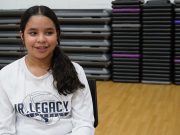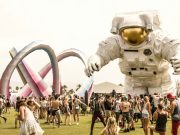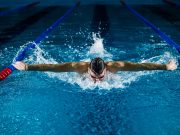The school bell rings, and class begins. I look around my Star Wars-themed classroom, where the Millennium Falcon and Luke Skywalker’s famous X-Wing hang from the ceiling on fishing line. All 22 of my ESOL level 1 students are excited to learn English. Ten years ago, I never thought I would be where I am today.
I remember it as if it were yesterday. It was early Christmas morning in 2013, and I was having a rough time sleeping in a cot at Baptist Hospital. I was awakened by a tall, slender Egyptian man who smelled of coffee and had messy, salt-and-pepper hair. A petite woman with hazel eyes and a soft smile stood beside him. I was confused and scared. I turned to my father standing by the window for courage.
“Good morning, Mr. Cabrera. My name is Dr. Doured Daghistani, you can call me Dr. D. I am an oncologist for Baptist.” He paused then gave me the bad news. “I regret to inform you that you have stage-3 non-Hodgkin’s Lymphoma. There is a mass between your stomach and spleen. Your survival rate is only 25%.”
He paused again, then added, “Don’t worry because my wife, Ms. Sahar, and I will treat it with chemotherapy. We will take care of you. But it will be a little nightmare.”
What is Lymphoma? Stage-3? I wondered. Isn’t that like cancer or something? I’m only 17. Isn’t cancer what older people get from smoking too many cigarettes? Why me? What about playing football? Will I ever know what it’s like to have a girlfriend? Wait, screw all of that, am I going to die?
Those were the thoughts clouding my mind after being diagnosed with an invisible villain hiding inside of me. “My own body is trying to kill me,” I thought. Yet, all I could do was trust this stranger. So, I smiled and said, “Let’s do this.”
The dreaded chemotherapy
I was scheduled to have a round of chemotherapy for one whole week from 7 a.m. to 7 p.m. This was going to be my life for the next six months. Instead of going to school like a typical senior in high school, I would be in the hospital, missing out on being a teenager. I had to grow up fast.

I was terrified walking into my first chemotherapy session. I wasn’t mentally prepared for it. I had only heard of some of the side effects, like losing my hair and possible nausea. No one told me it would also stink of antibacterial soap and coffee. To this day, the smell of coffee bothers me.
The oncology center for pediatrics in Baptist Hospital was much more inviting than the hustle and bustle of the hospital. Dr. D welcomed me. “Hey, my buddy O.J.” He knew I preferred to be called by my nickname. Then he sat me in a large room with a large mural of a sunny day at the beach and big royal blue reclining chairs. He brought in a tall IV pole with two pouches of what looked like Kool-Aid fruit punch and Yellow Gatorade.
“The red one attacks the cancerous cells, while the yellow one prevents the spread. We will give you some Benadryl to help with the nausea,” Dr. D said.
At first, I thought I could handle this chemotherapy thing. “It’s not as bad as the movies made it out to be. I am a champ,” I told myself. My mom took me to most sessions if she weren’t at work. I had never seen her cry so much. So, to comfort her, I smiled and acted cocky.
I would tell her that I was going to beat this. That I was going to kick cancer’s ass and that there was no way in hell that I was going to lose. I didn’t want her to see me weak. I wanted her to see me as the same strong son she raised who was playing varsity football at Hialeah High.
In truth, my mom was my crutch, and I relied on her strength. On the tough days when I felt like giving up, she reminded me of what I told her the same night I was diagnosed.
I promised her that I was going to do the small things right. So, I stuck to my word.
Doing all the small things right was our philosophical way of living. In contrast, others found faith in religion in hope of a miracle cure for this horrible disease or even going on a crazy holistic diet, eating superfoods to help the chemo do its magic. I did the small things right.
I made sure that as horrible as I felt, I would still get back up. When I had doubts about my future, I would shake my head and let go of the fear throbbing in my belly. I wasn’t going to live in fear. I would tackle this linebacker from Satan’s team and score the winning touchdown. I wouldn’t let my mom, dad or myself down.

About a month after having my first round of chemo, I started to feel the effects. While showering, clumps of wet hair fell from my head. I was terrified; I was scared to be bald. I thought to myself people would look at me weirdly. My best friend and my mom’s boyfriend supported me and bought a machine to cut my hair. They gave me a gnarly mohawk before we shaved it all off.
There were other side effects. I had a huge problem when it came to certain smells. If we were driving by a fast food restaurant, I smelled the grease in the air. I immediately became nauseous and lost my appetite. I also developed mouth sores that felt like I was chewing on razor blades. I went mute for a few weeks because of the sores. Too painful to chew food, I lost a lot of weight. The only remedy was morphine and popsicle sticks.
As time passed, the treatment started becoming more and more severe. I was prescribed Neupogen shots, which is a bone stimulant that helps the body make white blood cells after receiving the cancer medication. Little did I know that the side effects of the shot would be severe bone ache. One night, while resting in my Spider-Man-themed room, it felt as if my spine was ready to explode into a million pieces. I cried and screamed my mom’s name in agony. I felt like I was dying. My mom was terrified but calmly shushed me, stroking my head as I grasped her hand.
Chemo buddies
Seeing sick children is heart-wrenching, but weirdly I was happy to feel as if I wasn’t the only one. Eventually, I made friends with cancer patients my age. We called ourselves “chemo buddies.” We developed a sense of camaraderie. We were a team. We learned to appreciate each other’s company and dreamed about the future. We shared the first thing we would do once we were in remission. Yet, we also kept our guard up if we heard the bad news: “They didn’t make it.”
I became close to two individuals: Asa, who was 20, and Emily, a shy, beautiful 15-year-old girl who weighed 90 pounds wet. Asa was a huge role model for me. He was strong and inspiring. He was the type of guy who would put a huge smile on everyone’s face. He always kept my hopes up. The room would be so silent that you could hear a pencil drop until Asa entered. The one thing he loved more than making his presence known was flipping pancakes.
Emily was diagnosed a month before me and had stage 3 non-Hodgkin’s Lymphoma by the center of her spine. I grew close to Emily because her doctors gauged how she would react to chemotherapy based on my body’s response to it. If I were sick or had low platelets, they would assume it would only be twice as bad for her.
One day, a young woman named Noelia visited Dr. D’s office and talked about a camp she attended.
”We have so much fun every year. It’s called Camp Fiesta,” Noelia said. “We stay there for nine days and participate in different activities every day. We even go to Orlando to visit the theme parks. Everyone there has been through or is going through what you are experiencing. We are a family. Join us. It’s so much fun.”
At first, I was skeptical about Camp Fiesta. It sounded like some weird cult for kids with cancer. I thought it was embarrassing to meet all these people while my head looked like an almond. Asa, Emily, and my mother forced me to go. So, I agreed to it.
As the first day of camp arrived, I got cold feet. I didn’t want people to feel bad for me or see me sickly. I was stubborn and hardheaded and didn’t want to go. I was a total grouch with my arms crossed on the way to the campsite. I thought I had a master plan to get out of going. I hid my Bactrim (antibiotics) so I would be forced to go back home but my mom retrieved them.
Asa and Emily tried to make me feel comfortable. Asa played a joke and decided that we should all three say we are siblings. What a story that would’ve been if it were true. I took part in his conniving plan.
As we walked into the crowded lodge, three beautiful girls walked directly at us. One of the three girls stood out the most. She made me nervous. I felt shy and insecure. Her blue-gray eyes pierced right through me; every time she smiled. I felt the blood in my cheeks warming up. From that moment on, I knew that I had fallen in love.
”Hi, my name is Destini, and these are my best friends, Abby and Jhosey! Welcome to Camp Fiesta. You guys are going to love it here. What are your names?” Destini, my newfound crush, asked.
Destini was the reason why I stayed. From then on, we had the best summer of our lives.
My experience with Camp Fiesta made me realize how many things I take for granted. I had to let go of the bitterness, hate and resentment that I was holding onto since I was diagnosed. The experience helped me let go and feel at ease.
For the most part, helping and being part of this camp also made me realize that I liked working with children. Kids are brutally honest, and they always seemed to like me. They helped me open up and be myself.

Recovery
After my first year at camp, I received a fateful call from Dr. D’s office. I was terrified to get bad news. I assumed that either the cancer had spread or worse, and I only had a few days left to live. I remember walking into his tiny, messy office cluttered with stacks of manilla folders on the day of my appointment. He greeted me with his usual “Hey, My buddy O.J. ” He told me he had good news.
“The mass between your stomach and spleen is only nine centimeters long. The lymph node should only be a centimeter at that. In our last check-up, we did a CT scan and found the mass had reduced to three centimeters. We are going to do further analysis, but the mass is benign. That means no more chemotherapy.” Dr. D chirped.
I was more excited than my high school graduation day. I have a new chance at life! My eyes started to swell up, and I broke down into tears. The long nightmare was over.

It’s hard even to think or want to remember what I’ve been through. Yet, it all somehow made me the man I am today. I faced so many problems, so many demons. I’ve learned to grow from them. I knew that anything in life could be taken away instantly. Therefore, I had to enjoy every waking moment.
It might sound strange, but I’m grateful for my experiences. I might not be as happy and fulfilled as I am today. I have the girl of my dreams, Destini, the greatest cheerleader a man can ask for. She constantly motivates and encourages me to be the best version of myself. I also am in a career I love, as an educator. At Camp Fiesta, I looked at my friends Asa, Emily, and Destini as my heroes. I want my students to see me as their hero. I want them to look forward to coming to school and getting an education.
Today, I laugh that my biggest problem is the school’s principal calling me into her office and telling me to clean up my act — I dress too much like a surfer.

































